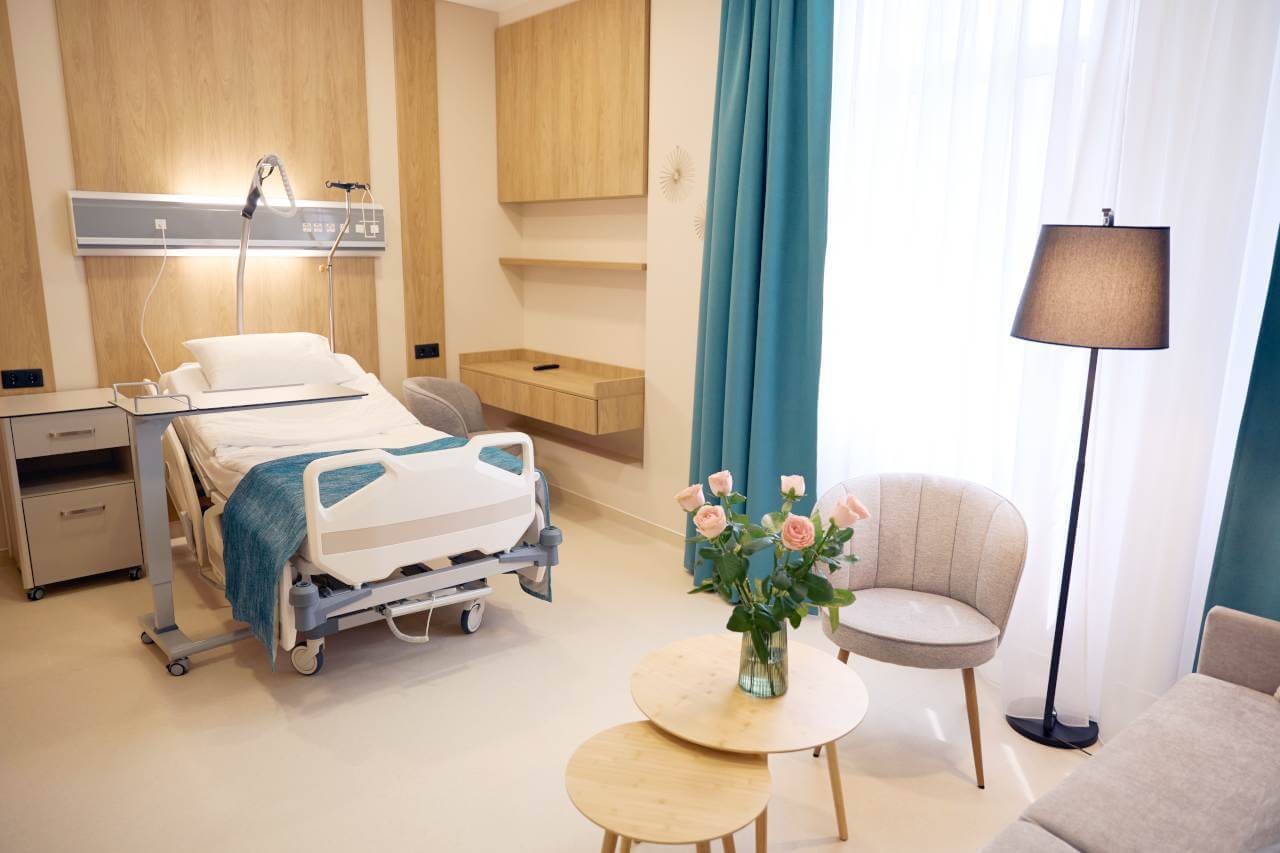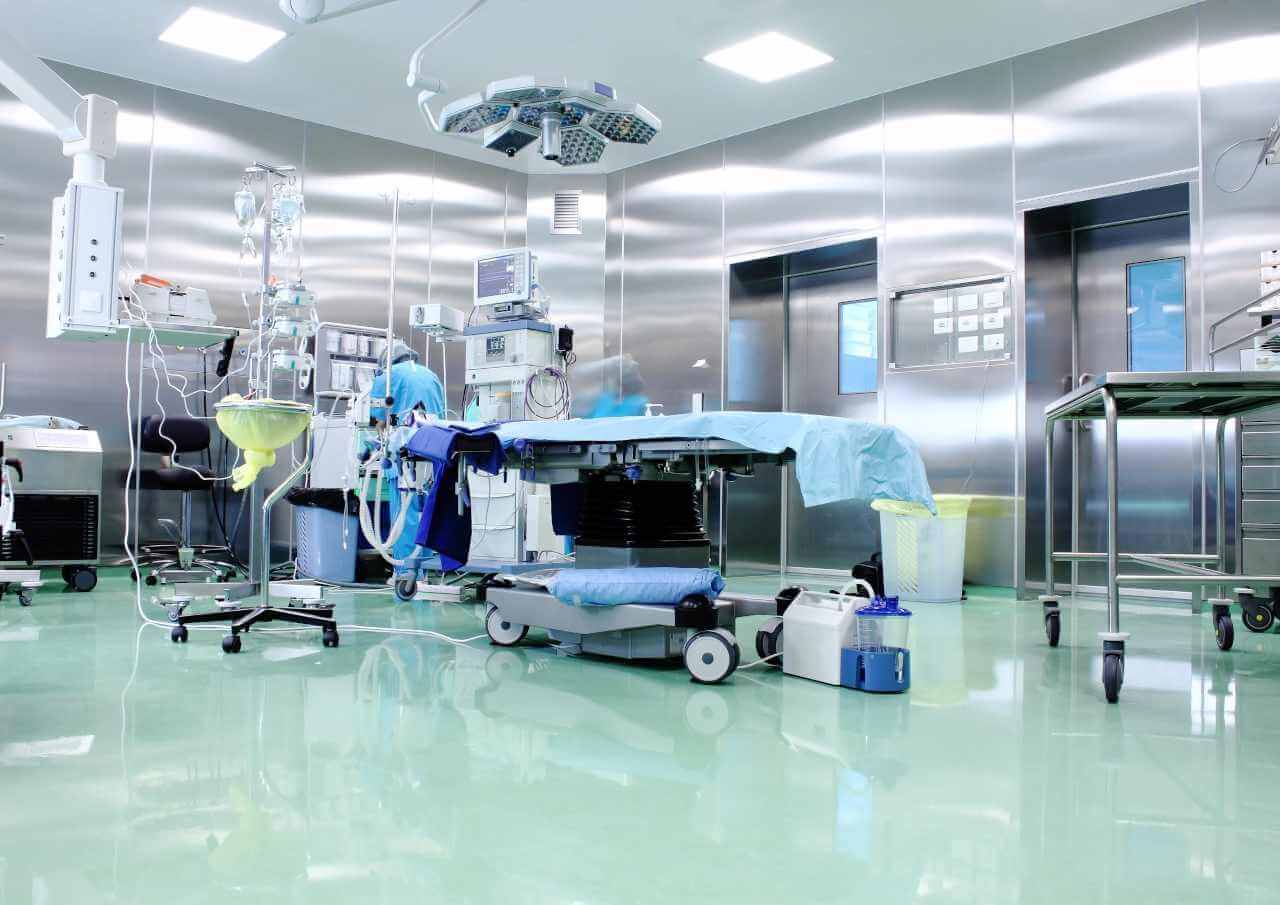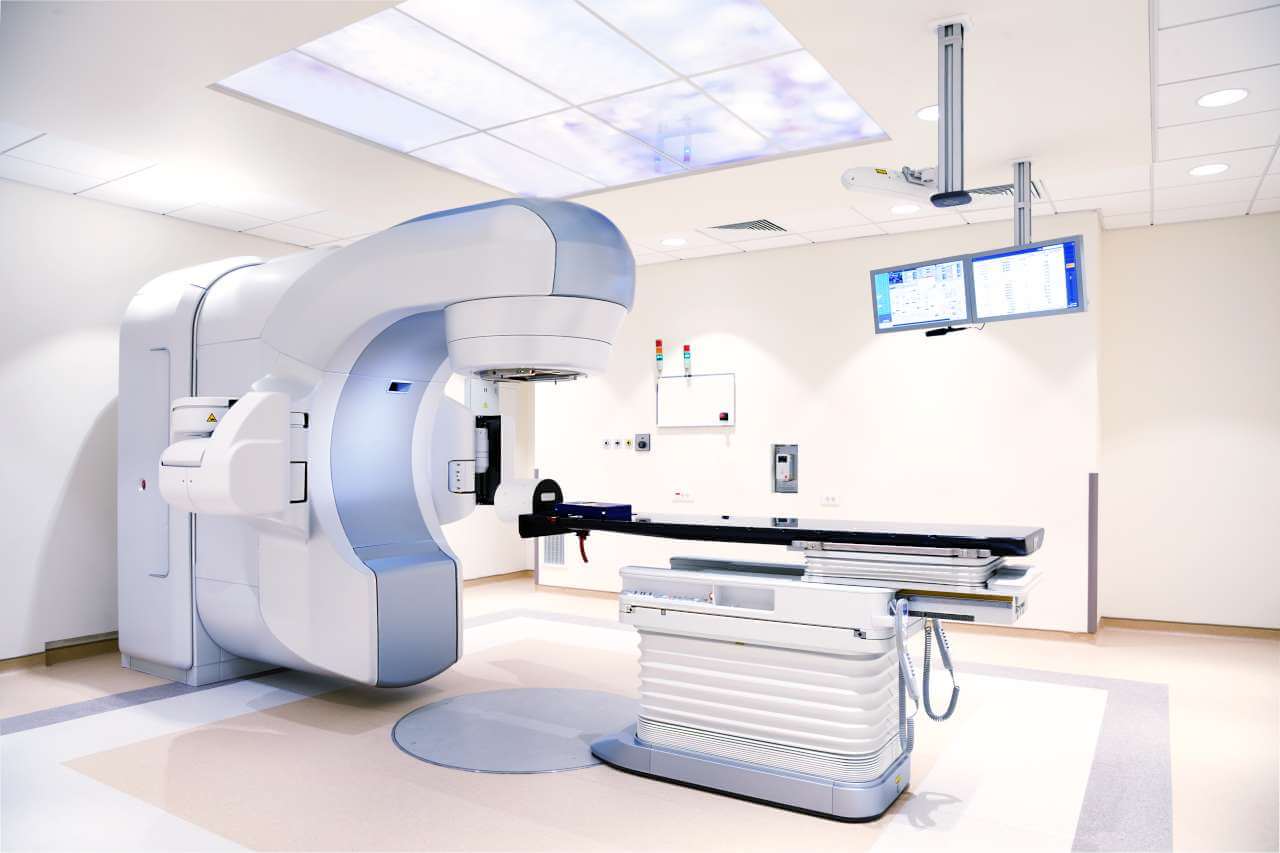
The program includes:
- Initial presentation in the clinic
- clinical history taking
- review of medical records
- physical examination
- neurological examination
- CT/MRI scan of head
(if indicated clinically, additional cost is 500/800€) - nursing services
- consultation of related specialists
- treatment by chief physician and all leading experts
- explanation of individual treatment plan
Required documents
- Medical records
- MRI/CT scan (not older than 3 months)
- Biopsy results (if available)
Service
You may also book:
 BookingHealth Price from:
BookingHealth Price from:
About the department
The Department of Adult and Pediatric Neurosurgery, Spinal Surgery at the Hospital Frankfurt (Oder) offers all the possibilities of modern medicine in the fields of its specialization. The department performs surgical treatment for brain, spinal cord, and spine diseases. The medical facility also admits patients with pathologies of the peripheral nervous system. The department has state-of-the-art operating rooms where surgeons regularly perform surgery for brain and spinal tumors, cerebrovascular malformations, hydrocephalus, herniated intervertebral discs, spinal canal stenosis, and spondylolisthesis. Young patients with brain and spinal cord diseases are operated on by a specially trained team of pediatric neurosurgeons. The doctors most often deal with the treatment of brain tumors and congenital malformations. The department's operating rooms are equipped with state-of-the-art technology, such as neuronavigation systems, devices for stereotactic surgery, neuroendoscopic equipment, intraoperative ultrasound devices, intraoperative neurophysiological monitoring systems, and operating microscopes. Neurosurgeons closely cooperate with neurologists, neuroradiologists, oncologists, and radiation therapists. The department's progressive technical infrastructure allows surgeons to perform operations of any complexity, ensuring high treatment safety. The Head Physician of the department is Dr. med. Uwe Schröder.
The focus of the department's neurosurgeons is on patients with benign and malignant brain tumors. The most common types of tumors encountered in clinical practice are acoustic neuromas, gliomas, and meningiomas. An acoustic neuroma is a benign neoplasm. The neoplasm grows from the sheath of the auditory nerve, which is responsible for hearing and maintaining balance. The department offers two treatment methods for acoustic neuromas: a stereotactic intervention (used for small neoplasms up to 3 cm in size) and a classical operation. Priority is given to stereotactic treatment, during which a single targeted irradiation of the tumor is performed according to the pre-calculated coordinates. The results of stereotactic treatment are comparable to those of surgery, with the advantage of high safety, because the risks of damaging the auditory nerve and functionally important brain structures are almost zero.
The department has also gained vast experience in the treatment of malignant gliomas and meningiomas. The optimal type of surgical intervention and a complex of conservative treatments for these neoplasms are determined based on the results of preliminary diagnostics, taking into account the stage of the tumor, its type, size, and location. Stereotactic surgery is preferred for small or hard-to-reach tumors. In other cases, doctors perform classical surgery under fluorescence guidance with five-aminolevulinic acid, neuronavigation systems, and surgical microscopes. The risk of damage to important brain structures is therefore eliminated for the patient. Classical surgery is complemented with chemotherapy, radiation therapy, targeted therapy, and/or immunotherapy.
Another important focus of the work of the specialists at the medical facility is the treatment of brain aneurysms (an aneurysm is a pathological localized bulging of the brain artery wall). In most cases, an aneurysm does not cause any symptoms, so the patient may not even be aware of its presence. If the aneurysm reaches a large size, patients may suffer from headaches, vision impairments, ophthalmoparesis, and sensory, speech, or hearing disorders. The most modern and minimally traumatic method of removing the brain aneurysm is coiling. The intervention is performed using endovascular techniques through an image-guided puncture of the femoral artery. The therapeutic effect is achieved by filling the aneurysm cavity with a special soft platinum coil, as a result of which it is deprived of blood supply and "turned off" from the bloodstream. If the patient's clinical situation does not allow for endovascular treatment, neurosurgeons consider the possibility of microsurgical intervention, such as clipping. During this operation, a metal clip is placed at the base of the aneurysm to eliminate the risk of its rupture by depriving it of blood supply.
The department's team of spinal surgeons specializes in the surgical treatment of cervical, thoracic, and lumbar disc herniation, spinal stenosis, spondylolisthesis, spinal cord tumors, spinal tumors, and spinal injuries. Almost all spinal interventions are performed using minimally invasive surgical techniques. Endoscopic techniques are often used for the treatment of spinal disc herniation. When performing surgical interventions, the specialists use state-of-the-art surgical microscopes and neuronavigation systems, which ensure the highest precision of surgical manipulations.
The department's range of surgical services includes the following:
- Neurosurgery
- Adult neurosurgery
- Surgery for brain tumors: acoustic neuromas, gliomas, and meningiomas
- Surgery for neurovascular diseases and vascular malformations: brain aneurysms, arteriovenous malformations, and cavernomas
- Surgery for motor disorders of neurological origin: Parkinson's disease, tremor, dystonia, and spasticity
- Surgery for intracerebral hemorrhages
- Surgery for traumatic brain injuries
- Surgery for hydrocephalus
- Surgery for peripheral nerve diseases: carpal tunnel syndrome and trigeminal neuralgia
- Pediatric neurosurgery
- Surgery for brain tumors
- Surgery for hydrocephalus
- Surgery for congenital malformations of the central nervous system
- Surgery for traumatic brain injuries
- Adult neurosurgery
- Spinal surgery
- Surgery for cervical, thoracic, and lumbar disc herniations
- Surgery for spinal stenosis
- Surgery for spondylolisthesis
- Surgery for spinal cord and spinal tumors
- Surgery for spinal injuries in adults and children
- Other medical services
The department offers the following surgical techniques for the treatment of diseases of the nervous system:
- Minimally invasive surgery
- Microsurgical operations
- Endoscopic surgery
- Neuroendovascular interventions
- Stereotactic surgery
- Fluorescence-guided surgery using 5-aminolevulinic acid
- Deep brain stimulation
- Other surgical techniques
Photo of the doctor: (c) Klinikum Frankfurt (Oder)
About hospital
The Hospital Frankfurt (Oder) has an excellent reputation in the national and international medical arena, providing patients with high-quality medical services in accordance with the standards of modern medicine. The healthcare facility is an academic hospital of the Charite University Hospital Berlin and is also part of the Rhön-Klinikum AG medical concern. The health of patients is in the safe hands of a team of highly professional doctors and nursing staff, which, combined with advanced infrastructure and technical equipment, allows doctors to work wonders, curing patients from the most severe diseases.
The hospital has 25 specialized departments as well as highly specialized centers and institutes. Thus, almost all areas of medicine are represented here, including general, abdominal and thoracic surgery, neurosurgery, vascular surgery, orthopedics and traumatology, ophthalmology, dermatology, gastroenterology, nephrology, neurology, pediatric and adolescent medicine, radiation oncology, urology, etc. Special competence exists in the fields of gastroenterology, nephrology, infectology, rheumatology, and endocrinology. In addition, the hospital successfully carries out cell therapy and has been brilliantly performing autologous stem cell transplants on patients with hematological diseases and cancers for many years. The medical facility is the only one in the federal state of Brandenburg that performs allogeneic stem cell transplants from related donors.
All the hospital's doctors cooperate closely with each other, providing patients with comprehensive interdisciplinary treatment. An important component in the work of physicians is a humane attitude towards their patients and support for a patient on his way to recovery.
The medical center is certified in accordance with the DIN EN ISO 9001:2015 requirements and is awarded the IQM (Initiative Qualitätsmedizin) quality certificate, so patients can be sure that they will receive excellent medical service and successful treatment results.
Photo: (с) depositphotos
Accommodation in hospital
Patients rooms
The patients of the Hospital Frankfurt (Oder) live in comfortable single and double rooms with a modern design. The patient room furnishings include an automatically adjustable bed with an orthopedic mattress, a wardrobe, a desk, an armchair with a coffee table, a safe, a mini-fridge, a Full HD flat-screen TV, a telephone, and a radio. Each patient room has Wi-Fi access. The patient rooms are equipped with an ensuite bathroom with a shower and toilet, a heated towel rail, a hairdryer, a cosmetic mirror, a set of toiletries, a bathrobe, and bath towels.
Meals and Menus
The patients of the hospital are offered three tasty and healthy meals a day: breakfast, lunch, and dinner. If, for some reason, you do not eat all the foods, please inform the medical staff in advance, and you will be offered an individual menu.
The hospital also has a cozy cafe where one can taste a delicious meal, a cup of coffee, or tea with dessert. In the warm season, an open terrace is also available here.
Further details
Standard rooms include:
![]() Shower
Shower
![]() Toilet
Toilet
![]() Wi-Fi
Wi-Fi
![]() TV
TV
Religion
The hospital has a prayer room open to patients and their relatives. One can stay alone for a prayer, and holy masses are regularly held here.
Accompanying person
Your accompanying person may stay with you in your patient room or at the hotel of your choice during the inpatient program.
Hotel
You may stay at the hotel of your choice during the outpatient program. Our managers will support you for selecting the best option.





